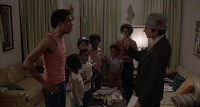Schrader's scathing minimalistic directorial adaptation of his own screenplay, Blue Collar is a tightly wound, abrasive, thought provoking, occasionally funny film with universal commentary on the effects of social class and money on friendship and family. It is a vicious social satire that also does not take itself too seriously.
 |
| "Fuck Uncle Sam!" |
The opening credits thrust us into the hustle and bustle of the plant, the three protagonists' second home. Captain Beefheart's bombastically bluesy, rough-hided "Hard Workin' Man" drives the imagery rather than simply fade into background music. Beefheart's gruff vocals and lyrics paint an image of a weathered and hardened man of with enough wisdom and physical drive to make up for academic interest with lyrics like "When I was a school boy / teacher said study as hard as you can / It didn't make no difference / I'm just a hard workin' man," spot on for Smokey's character.
The heavy machinery complements the pounding percussion, the pervasive electric guitar punches like power tool, and the harmonica sings the song of a hardened heart full of dread and despair. Beefheart also has a similar song from his early catalogue "Plastic Factory," a song similar both stylistically and lyrically. "Fac'trys no place for me / Boss man let me be," says Beefheart. These two simple lines succinctly sum up much of the films complex thematic elements.
 |
| Zeke sells his soul. |
Ruthless tendencies aside, Zeke is a loving father and husband, despite a scene of brief infidelity at a get together with his two friends (to be expound upon later). He is an ambitious man who seems much too overqualified for the grunt job he has worked for years to support himself and his family. He is frustrated about the color of his skin repressing his potential in life. Zeke knows that he is smarter, more shrewd than even his bosses, his alleged superiors and isn't afraid to show it.
 |
| Getting dressed for Halloween |
Before selling out to The Union, Zeke explains to Jerry how he's "thinkin' white." When asked what this meant to him, Zeke feels that Jerry has many more chances than him, and always will. Zeke sees this as his only chance, and he is determined to take it. He continues: "I'm black, Jerry. The police aren't gonna protect me. Six months after this fuckin' thing's over I'll be right back where I started from, living in some ghetto up to my black ass in bills wondering what night they're gonna come and kill the kids, Carolyn and myself." At this point he genuinely believes he can make changes within the union as foreman.
 |
| A true blue collar man |
Blue Collar is a white collar high class achievement for Paul Schrader, as both director and screenwriter. The props don't stop there without mentioning the stellar cast and pacing. An underrated and often neglected film with complex insight into human nature's proclivity for selfishness.
Overall Grade: 8.9/10


No comments:
Post a Comment